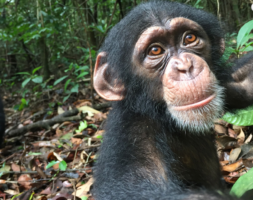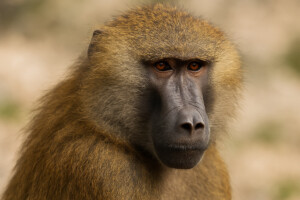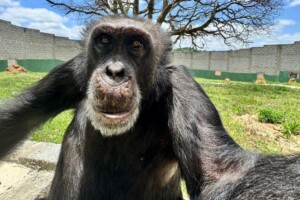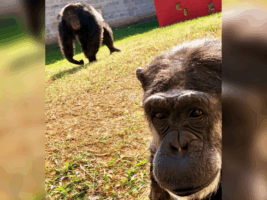The intelligence of Great Apes

Now that I have just read this excellent article by the biologist Fernando Reinach, in newspaper O Estado de São Paulo, last July 29, which is reproduced here, I understand how the Great Apes are smart in their survival.
Something I did not understand was the reason why Carol, Guga, and Samantha constantly asked me to tear leaves from the trees around their enclosures to eat them. How do they prefer to eat those leaves, some even bitter, instead of the excellent variety of fruits and vegetables we offer them every day?
Now I understand that they do not want to be dependent on a diet that may one day not exist, diminish or disappear. Those plants that surround them, (maybe) they think they will always be there and represent their food survival.
Dr. Pedro A. Ynterian
General Secretary GAP Project International
Read the article Option for agriculture (Estado de SP newspaper, Juky 29th 2017):
“The square recalls the year 1845 in Ireland, a poor and troubled country with a population of almost 8 million people, run by London as a colony. The potato, introduced into the country in the seventeenth century, quickly became the main food of the poor who cultivated it for their own consumption. By the middle of the eighteenth century, one-third of the population had potatoes as their only source of income. It was when a fungus called Phytophtora infestans arrived in the country and attacked the potato plantations. In two years, production fell from 14 million to 2 million tons. Acute and abrupt hunger decimated the population. There were 1 million dead in a couple of years – one in eight people died of starvation. The accounts describe people trying to graze to survive, the dead lying in the fields. The number of dead people would be higher if 1 million people had not left the country, many to the region of Boston. The Kennedy family and other descendants of Irish have made a living in America.
The causes of Gorta Mór, the great hunger of 1845, are complex, but its outcome is due to the substitution of a large variety of plant and animal foods for a single one, potato. With that, Ireland put all her eggs in the same basket, and when the bottom came, the basket fell, and they all split.
Maintaining the proportions, mankind today lives a similar situation. Three-quarters of all calories ingested by mankind come from only six plant species: rice, corn, wheat, soy, potato, and manioc. Worse, the first three account for 50% of the food consumed by mankind. This is despite the fact that there are more than 250,000 species of edible plants on the planet. Knowing that the global stock of food is not enough for even a year, imagine what would happen if one of these three species disappeared. Hundreds of millions of people would starve.
Our foolish food dependency is relatively recent, it began with the discovery of agriculture 15,000 years ago. In the 985,000 years before, from mankind appearance to the first plantations, humans have lived collecting and hunting, feeding on the hundreds of species of edible plants they found in the environment and from occasionally hunted animals. The last populations that maintain this lifestyle are disappearing since the beginning of this century. Over the past 15,000 years, as agriculture has spread, food diversity has been reduced as more productive species occupied an increasing fraction of our diet.
The adoption of agriculture is not without reason. It increases our ability to produce food. Fewer and fewer people are needed to produce the food they all consume. Modern Brazilian farms employ one worker for every 150 hectares, producing food for thousands of people. This brutal increase in productivity allowed human beings to live in cities and engage in other activities, such as scientific and technological development and the arts. Much of humanity has ceased to be involved in food production, crops have flourished, and the human population has grown so much that today it threatens its own survival. Today, with 7.5 billion mouths to feed, this path seems irreversible.
What the small square in Boston reminds us is that the option for agriculture involves not only benefits, but also risks. One of them is starving. ”
FURTHER INFORMATION: AFFLUENCE WITHOUT ABUNDANCE, JAMES SUZMAN, ED BLOOMSBURY, 2017
Source (in Portuguese):
Http://ciencia.estadao.com.br/noticias/geral,opcao-pela-agricultura.70001911914

 Español
Español
 Português
Português








